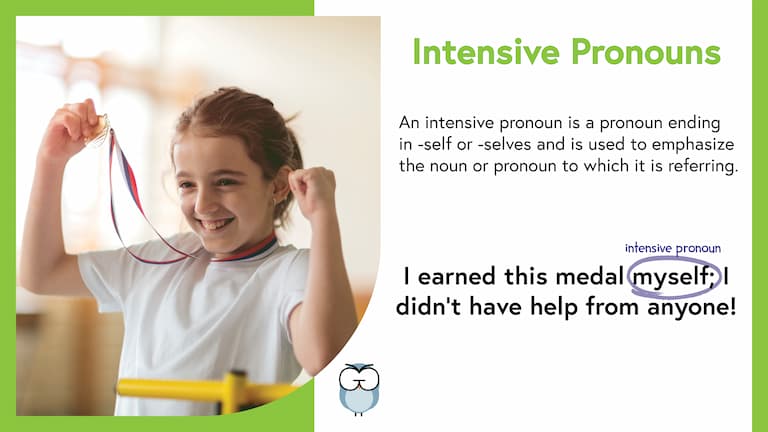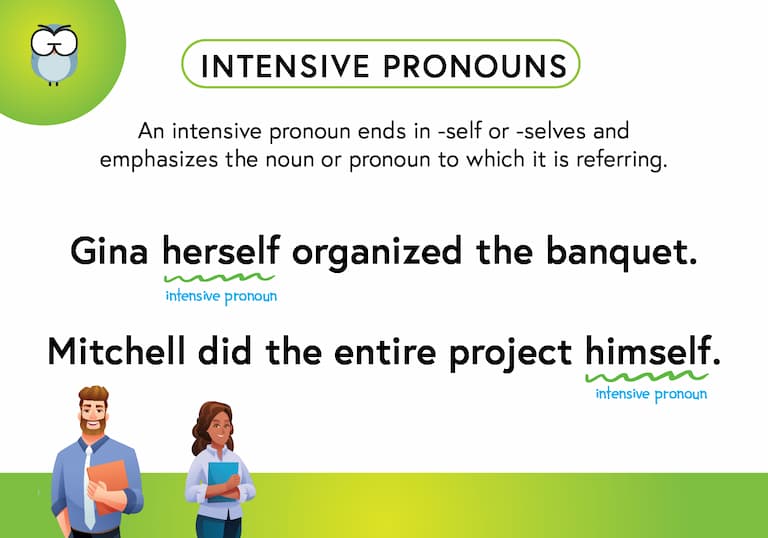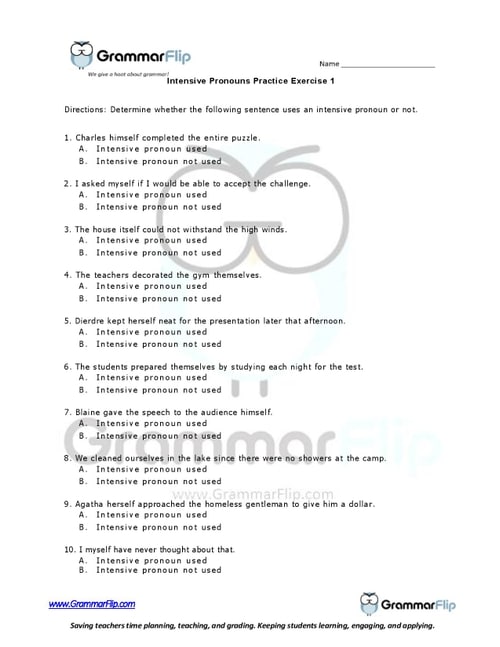What is an Intensive Pronoun?
An intensive pronoun is a pronoun ending in -self or -selves and is used to emphasize the noun or pronoun to which it is referring. Intensive pronouns take the same forms as reflexive pronouns but are used differently.
Some examples of intensive pronouns would be the following: myself, yourself, himself, herself, itself, ourselves, yourselves, and themselves.
Gina herself organized the banquet.
Mitchell did the entire project himself.
I myself am a fan of mystery novels.
We painted the whole house ourselves.
Long-Form Videos: Intensive Pronouns
Long-form instructional video lessons allow students to engage with grammar concepts in more depth and detail.
This format provides students with a stronger foundation and a more comprehensive understanding of intensive pronouns.
Short-Form Videos: Intensive Pronouns
Short-form videos are an excellent way to review grammar concepts. Our two-minute instructional videos help students review the concept of intensive pronouns to further solidify their understanding.
Memorable Images: Intensive Pronouns

The use of images to connect visual cues with concepts makes it simpler for students to grasp and remember key ideas. GrammarFlip’s memorable images create visual associations that make intensive pronouns more engaging and easier to retain.
Definition Cards: Intensive Pronouns
Definition cards reinforce grammar concepts by providing clear and concise explanations that students can easily reference for quick review and better retention. GrammarFlip’s definintion cards help students review the concept of intensive pronouns to further solidify their understanding.

When You Should Use Intensive Pronouns in Your Writing
The two most relevant reasons to use intensive pronouns in your writing are uniqueness and emphasis.
Uniqueness: Intensive pronouns indicate that an individual, distinctly different from others, is unique in some way.
The woman carried all of the heavy boxes herself in one trip.
Using “herself” in this sentence implies an element of being unique from others.
Emphasis: Use intensive pronouns in your writing when you want to emphasize something.
The boy himself solved the entire puzzle.
The intensive pronoun “himself” emphasizes the fact that it was only the boy who solved the puzzle, without help from any others.
Be sure not to confuse intensive pronouns with reflexive pronouns which take the same form but are used completely differently.
Download a Free Worksheet on Intensive Pronouns!
Click the image below to download your free worksheet on intensive pronouns!

Need a grammar program that provides the instruction and grading for you?
Explore More GrammarFlip Lessons!
Parts of Speech lessons provide the building blocks of grammar. GrammarFlip covers these topics in detail to ensure a solid foundation is built. First time learners and students seeking to review the parts of speech can both benefit from the instructional videos and slide show reviews.
Parts of the Sentence lessons are critical for understanding how the parts of speech function in language construction. From the basic to the advanced, these lessons will cover a wide range of grammar topics that can be used in any grade level or classroom.
Mechanics and Usage lessons equip students with the necessary skills to communicate clearly to all audiences. With a focus on the application of these concepts in student writing, these lessons tie together both simple constructions of grammar as well as the more complex such that any age or skill level of student will benefit.


